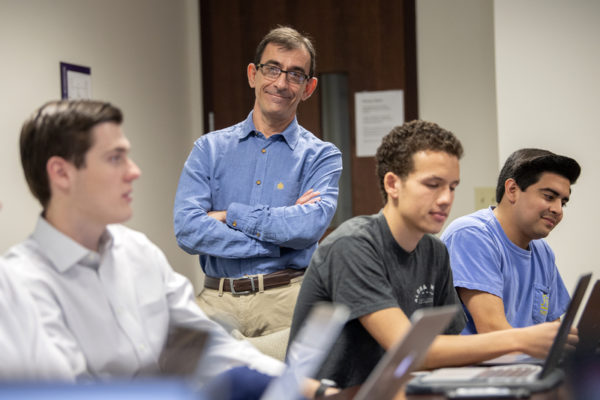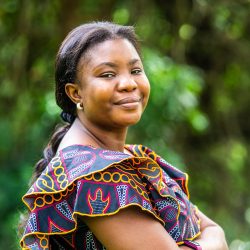
Dr. Juan Carlos Sola-Corbacho is a historian with a passion for equity and an avid interest in the dissemination of information across time.
Born in Spain, he grew up in a culture where he notes, “the situation of women was terrible.” He remembers, “There were maybe three or four limited roles that women could play in society.”
He also spent some time in Mexico, where the situation was not much better. He reflects that his international experiences before settling in the United States inspired him to work towards a more equitable and balanced world – which, he hopes, can happen in his classroom.
“Seeing how different [the cultures of] these three countries are makes me think of what I should bring to class every day to encourage equity and fairness,” he reflects.
He believes that information – particularly news and journalism – is a major component of learning to understand and accept the differences that make us human.
“As a historian, I believe we need to understand our presence [in the world] from a historical standpoint,” he said. “I think studying history is very important – because history teaches us how we act. We can learn about human beings and all their creations, societies and cultures and that will help us understand our presence,” he elaborates.
He encourages his students to regularly seek out news and information and wishes that everybody would read a (reputable) newspaper every day.
He is also a strong believer that a fairer and more equitable world starts with an informed population. “The idea in my class is not only to read the newspaper, but also to discuss what is published.”
Those discussions can sometimes get uncomfortable when centered around controversial or loaded topics, but that’s just a part of the human experience. “I don’t have ‘limits’ in my class. Life is the ‘limit,’” he said.
Sola-Corbacho’s classes have a deep historical context, but center around topics that may not otherwise be covered in a conventional history course. He strives to expose students to unique topics they may not have otherwise encountered, like the experiences of ethnic or sexual minorities.
 He recalls a particularly poignant experience when his students had a chance to connect
with Ms. Delphine Konda, a feminist activist from Cameroon and founder of “Girls Excel,”
a social impact organization that creates access to sexual and reproductive health
education and feminine hygiene products for girls and young women in rural communities
in Cameroon. Konda spoke about her lived experiences in Cameroon, including her time
working at a refugee camp and her memories from an armed conflict between Anglophones
and Francophones within the country, a time she could clearly hear gunfire outside
of her office.
He recalls a particularly poignant experience when his students had a chance to connect
with Ms. Delphine Konda, a feminist activist from Cameroon and founder of “Girls Excel,”
a social impact organization that creates access to sexual and reproductive health
education and feminine hygiene products for girls and young women in rural communities
in Cameroon. Konda spoke about her lived experiences in Cameroon, including her time
working at a refugee camp and her memories from an armed conflict between Anglophones
and Francophones within the country, a time she could clearly hear gunfire outside
of her office.
“The impression that she had on my students – and my students on her – was amazing,” he said, describing the captivated atmosphere in the room. “It was astounding to see the human connection in action, despite being so far away and so different – among other things – in appearance and life experiences.”
“Honors classes are not only an amazing experience for students,” he said. “[As a professor], I have had incredible human experiences in these classes every semester.”